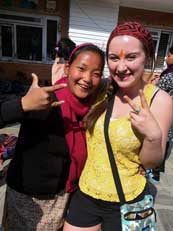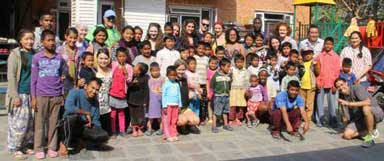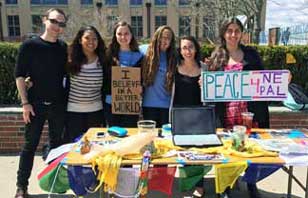 KINGSTON, R.I. – May 5, 2015 – Soni Pradhanang was sound asleep when her phone rang at 2 in the morning just over a week ago. Her brother in Nepal was on the other line.
KINGSTON, R.I. – May 5, 2015 – Soni Pradhanang was sound asleep when her phone rang at 2 in the morning just over a week ago. Her brother in Nepal was on the other line.
“We just got hit by a massive earthquake,” he said, his voice trembling. “But we’re OK.”
The conversation lasted less than 10 seconds, but it was long enough to send the University of Rhode Island professor into a panic: Would there be aftershocks? Was anyone injured? Was their house destroyed?
For hours, Pradhanang tried frantically to reach her parents and in-laws without success. The phones weren’t working. She turned on the TV and wept. The streets where she had spent her childhood days were rubble.
“It was so sad words cannot describe the feeling,” she says. “Those are the places I went every day as a girl. I felt so helpless.”
 Today, Pradhanang and URI students with ties to Nepal are raising money to help victims of the April 25 earthquake that, so far, has left 7,250 dead. Thousands more are still missing.
Today, Pradhanang and URI students with ties to Nepal are raising money to help victims of the April 25 earthquake that, so far, has left 7,250 dead. Thousands more are still missing.
Pradhanang, of North Kingstown, grew up in the capital of Kathmandu, not far from the quake’s epicenter. Her family house is a short walk from the Hindu temples of Durbar Square – now piles of rocks.
She and her husband, also from Kathmandu, moved to the United States in 2001. Pradhanang got her master’s degree in forest ecology and management from Yale, then got her doctorate at State University of New York, Syracuse. She joined URI in September, teaching water quality courses in the Department of Geosciences.
Her family members in Nepal are safe, but she still worries, especially about her parents, whose house is unsafe with cracked walls. They’re living with neighbors.
“My parents are very fragile,” she says. “They’re scared. They managed to buy water, and they have some food stocks. I talk to them every six hours. I ask my brother to call me and tell me everyone is OK.”
Initially, Pradhanang thought about collecting supplies and sending them to Nepal, but shipping fees are costly and runway damage has forced Nepalese authorities to close the main airport.
 Now she is encouraging Rhode Islanders to donate to Oxfam, UNICEF, the American Red Cross or other relief groups. To contact Pradhanang, call 401-874-5980 or email her at spradhanang@uri.edu.
Now she is encouraging Rhode Islanders to donate to Oxfam, UNICEF, the American Red Cross or other relief groups. To contact Pradhanang, call 401-874-5980 or email her at spradhanang@uri.edu.
“There are thousands of victims and survivors who have become homeless,” she says. “They need our help.”
URI sophomore Ashma Kc, a native of Nepal living in East Providence, and freshman Helena Fierle, of Asheville, N.C., are among 16 or so students teaming up with the URI Center for Nonviolence and Peace Studies to raise money for survivors. The total collected so far: $3,000.
The students set up tables outside the Memorial Union and the dining hall, and Ashma and Kc gave presentations about Nepal and the magnitude-7.8 earthquake in their classes.
 The money will be sent to an early childhood facility outside of Kathmandu, where Fierle and other URI students volunteered during a recent trip to Nepal as part of a nonviolent training course offered through the peace center.
The money will be sent to an early childhood facility outside of Kathmandu, where Fierle and other URI students volunteered during a recent trip to Nepal as part of a nonviolent training course offered through the peace center.
“I feel it’s my responsibility to help,” says Fierle, who is studying international relations. “I think this is the least I can do. I’m relieved and blessed to be home safely. The roof over my head is such a privilege. As humans, I think it’s our duty to relieve the suffering of others.”
Kc, who moved with her family to the United States in 2007, says that her aunts, cousins and other relatives are safe, but living in tents – and they’re the lucky ones. Some people are without shelter. Food is scarce; some families are eating dead animals to survive.
“Now people are worried about getting sick from spoiled food,” says Kc, a global health studies major. “Bad water could also cause illnesses. It’s the rainy season. I saw a child drinking water from the river, and that’s not good.”
Kc – one of many students from Nepal touched by the disaster – is in touch with her aunt every day.
“She’s scared her house might collapse any time,” she says. “I want to cry, but I don’t want to be weak. I want to be strong for her. I want to show her all my support.”
Nepal is one of the poorest countries in the world. Kc and Fierle say the Nepalese people are resilient and will rebuild.
“Nepal will never be the same for me,” says Kc. “The places I used to go – the parks, the schools, the temples – are gone. But the people will come together, as they always do.”
Fierle agrees: “They’re some of the happiest people I’ve ever met. They’re beautiful, and they’ll overcome.”
For information, email Kc at ashmak7@my.uri.edu or Fierle at helena.fierle@gmail.com.
People can also contact Paul Bueno de Mesquita, a URI psychology professor and director of the Center for Nonviolence and Peace Studies, at paulbdem@uri.edu or call him at 401-874-2875.
In addition to the early childhood facility, the center is also helping the Butterfly Home, a shelter for neglected Nepalese children, and Maiti Nepal, which rescues and cares for victims of sex trafficking. The center has been working in Nepal for five years.
“Young women and children are without shelter and basic supplies of food and water, as early relief efforts have been chaotic and disorganized,” says de Mesquita. “We have been supporting these kids during our annual visits to Nepal. We are deeply connected to them.”
To donate, visit The Nepalese Relief Fund.
Pictured above
URI student Ashma Kc, of East Providence, at her grandparents’ house in Nagarkot, a village outside Kathmandu, Nepal, earlier this year. Photo courtesy of Ashma Kc.
URI student Helena Fierle, of Asheville, N.C., visits with a 10-year-old student at the Early Childhood Development Center in Nepal during a nonviolence training class in March. Photo courtesy of Helena Fierle.
URI students and Nepalese residents in Kathmandu, long before the earthquake. The children in the photo are now living in a field behind the house, which was damaged by the quake and is unsafe. Photo courtesy of Paul Bueno de Mesquita.
URI students at donation table, left to right, Matt Reinhardt, Grishma Shrestha, Helena Fierle, Ally DeMello, Cassandra Cangiano and Ginnelle Bruscini. Photo courtesy of Paul Bueno de Mesquita.

